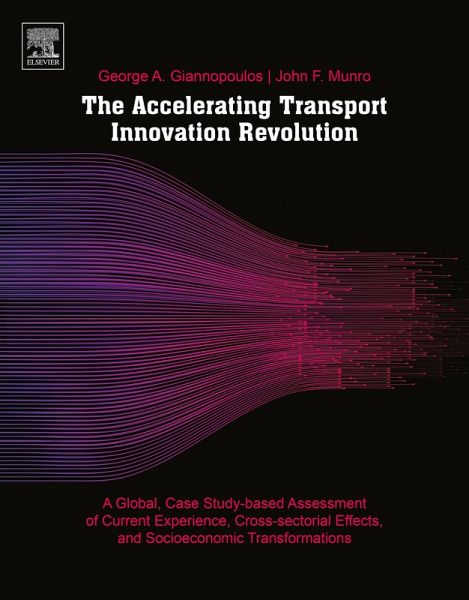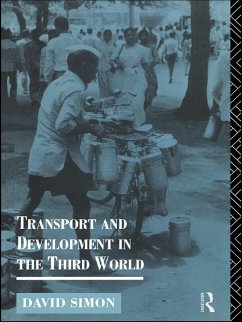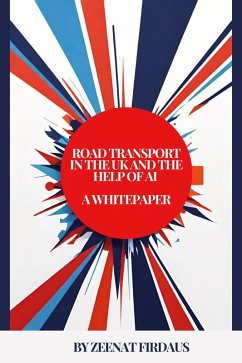
The Accelerating Transport Innovation Revolution (eBook, ePUB)
A Global, Case Study-Based Assessment of Current Experience, Cross-Sectorial Effects, and Socioeconomic Transformations

PAYBACK Punkte
38 °P sammeln!
The Accelerating Transport Innovation Revolution: A Global, Case Study-based Assessment of Current Experience, Cross-sectorial Effects and Socioeconomic Transformations, offers a comprehensive view of current state-of-the-art and practices around the world to create innovation on a revolutionary scale and connect research to commercial exploitation of its results. It offers a fascinating new model of the innovation process based on theories of biological ecosystems, general systems theory and basins of attraction (represented through space-time graphs well known in mathematics). Furthermore, i...
The Accelerating Transport Innovation Revolution: A Global, Case Study-based Assessment of Current Experience, Cross-sectorial Effects and Socioeconomic Transformations, offers a comprehensive view of current state-of-the-art and practices around the world to create innovation on a revolutionary scale and connect research to commercial exploitation of its results. It offers a fascinating new model of the innovation process based on theories of biological ecosystems, general systems theory and basins of attraction (represented through space-time graphs well known in mathematics). Furthermore, it considers - through a number of dedicated chapters - key issues and elements of innovation ecosystems, such as: Causal Factors and system constraints affecting the development and sustainability of innovation ecosystems (Chapter 4); Review of innovation organization and governance in key countries and regions (Chapter 5); the role of technological "Spillovers" (Chapter 6); Collection and use of data for innovation monitoring and benchmarking (Chapter 7); Intellectual Property protection between competing ecosystems (Chapter 8); Economics of innovation (Chapter 9); Public and private sector involvement in Transport innovation creation (Chapter 10); the role of the individual entrepreneur - innovator in energizing change (Chapter 11). Finally, in Chapter 12, there is a thorough summary of key findings. This book uses a paradigmatic approach to augment the innovation ecosystem model of innovation that integrates beliefs and learning into the innovation ecosystems model. It therefore includes ten case studies from the U.S., Europe and Asia, detailing how innovation is created across continents and different ecosystems and what are the critical lessons to be learned. It does this, effectively, at five different levels of analysis i.e. the individual innovator / entrepreneur level, the organization level (government agency or company), the regional ecosystem level, the nation-state level and the global - systemic or international level. Each level of analysis, reveals unique features of the innovation landscape and the ten case studies allow the reader to assess when and where specific "enablers" are facilitating innovation especially on a revolutionary scale. The need for the book came from the realization that despite the billions of dollars spent on various research programs over the past 20 years (especially in the public sector), there have been few clear and tangible efforts directed at exploring how innovation production increasingly occurs and the critical factors necessary to sustain large-scale, revolutionary change as the future unfolds. Thus, a primary theme of the book is that understanding how research results translate into market innovation and implementation, especially understanding the nature of revolutionary innovation, is as important as the creation of innovations themselves. While the focus of the book is on Transportation, the concepts and recommendations presented apply to other fields too. - Formulates and presents a workable and comprehensive new model of innovation - Defines and analyzes many concepts and notions related to innovation, research and market implementation - Examines the critical factors affecting innovation production and successful commercial implementation of research results - Examines organizational models of coordination, governance, data collection, process analysis and use of intellectual property tools - Includes recent, well-researched and documented case studies of successful innovation ecosystems across the world mainly - but not only - in the Transport field
Dieser Download kann aus rechtlichen Gründen nur mit Rechnungsadresse in A, B, BG, CY, CZ, D, DK, EW, E, FIN, F, GR, HR, H, IRL, I, LT, L, LR, M, NL, PL, P, R, S, SLO, SK ausgeliefert werden.













